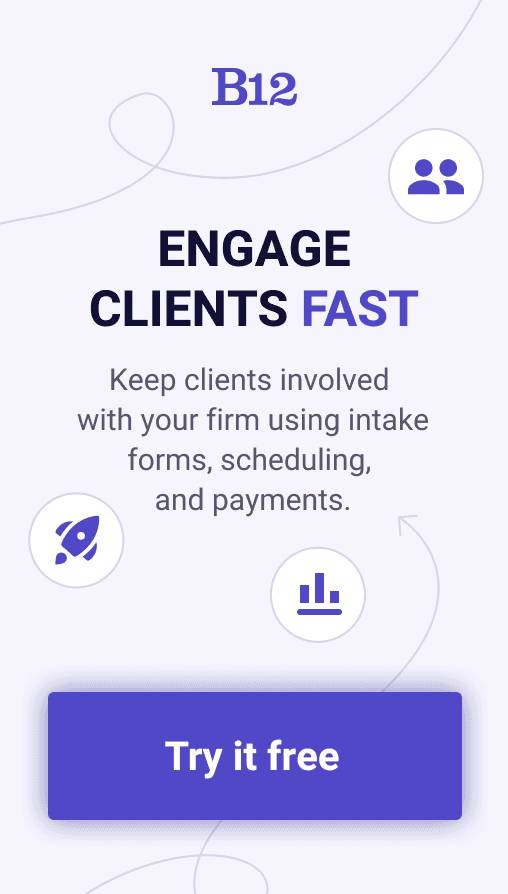Build an AI website in 60 seconds
AI generates your personalized website instantly with built-in scheduling, payments, email marketing, and more.
Start for free
How is AI used in legal forecasting?

AI has revolutionized a number of industries, including the legal field. The ability of AI to analyze large volumes of data and make accurate predictions has made it an essential tool in legal forecasting. In this post, we'll talk about how AI is used in legal forecasting, its role, and its advantages and limitations. Examining AI's applications in legal forecasting and discussing the challenges and ethical considerations associated with its use will give us a glimpse into this rapidly evolving technology's future.
The goal of legal forecasting is to predict the outcome of legal cases based on historical data. This process has traditionally relied on human expertise and intuition. However, AI has enhanced legal forecasting by providing data-driven insights and minimizing human bias. By analyzing vast amounts of legal data, statutes, case histories, and even social media trends, AI algorithms can help legal professionals make better decisions. Additionally, AI can identify patterns, correlations, and anomalies that aren't obvious to human analysts, improving legal predictions' accuracy and speed. As we dive deeper into the topic, we'll find out how AI has transformed legal forecasting and what the future holds for it.
What is AI legal forecasting?
AI legal forecasting is a rapidly developing field that leverages the power of artificial intelligence to predict legal outcomes and trends. As the legal industry becomes increasingly data-driven, AI plays a vital role in analyzing vast amounts of legal data, including court cases, statutes, regulations, and legal precedents to provide accurate forecasts. By applying machine learning and natural language processing algorithms, AI tools can now assess and interpret complex legal information more efficiently than ever before.
AI legal forecasting provides valuable insights for lawyers, judges, and legal professionals by helping them make informed decisions based on the analysis of historical data and patterns. With AI, legal forecasting becomes a more systematic and reliable process than traditional methods. By automating the analysis of past cases, AI can identify relevant factors and patterns that contribute to the outcome of a legal dispute. This technology enables legal professionals to assess the strengths and weaknesses of their arguments, estimate the odds of success in litigation, and develop effective legal strategies.
The role of artificial intelligence in legal forecasting
Artificial intelligence plays a crucial role in revolutionizing the field of legal forecasting. By leveraging advanced machine learning algorithms and natural language processing capabilities, AI systems analyze vast amounts of data to predict legal outcomes and assist legal professionals in making informed decisions.
One major role of AI in legal forecasting is its ability to analyze historical legal cases and identify patterns and trends. This enables AI systems to predict the outcome of future cases based on similar cases from the past. By considering various factors such as the judge's previous rulings, legal precedents, and the specific details of the case at hand, AI-powered forecasting tools can provide valuable insights and probabilities regarding the potential outcomes. This not only saves immense time and effort for legal professionals but also enhances their decision-making process, allowing them to strategize their legal arguments and allocate resources effectively. Furthermore, AI legal forecasting systems can continuously learn from new cases and update their predictions, ensuring they stay relevant and accurate in an ever-evolving legal landscape.
In addition to case analysis, AI also assists in legal forecasting by conducting extensive legal research within seconds. AI-powered systems can quickly sift through vast amounts of legal texts, regulations, and statutes to find relevant information and analyze it for potential outcomes. This significantly speeds up the traditionally time-consuming process of legal research, enabling legal professionals to access accurate and up-to-date information in a fraction of the time it would take manually.
AI can also identify inconsistencies or conflicting information within legal documents, reducing the risk of oversights or errors that could compromise the accuracy of legal forecasts. The ability of AI systems to handle large volumes of data and provide comprehensive analysis is unparalleled, making them invaluable tools in the field of legal forecasting.
Advantages and limitations of AI in legal forecasting
Artificial intelligence has revolutionized the field of legal forecasting, providing numerous advantages to legal professionals. One major advantage is the ability of AI systems to analyze vast amounts of legal data and extract meaningful patterns and trends. This allows for more accurate predictions and forecasts regarding legal outcomes, helping lawyers and judges make more informed decisions. By leveraging AI technologies, legal professionals can save valuable time in researching and analyzing past cases, as AI algorithms can quickly identify relevant precedents and summarize their key elements.
However, it is essential to acknowledge the limitations of AI in legal forecasting as well. One significant limitation is the reliance on historical data, which may introduce biases into the AI systems. If historical data is biased due to discriminatory practices or systemic inequalities, the AI algorithms may perpetuate these biases, leading to unfair predictions and outcomes.
Additionally, AI systems may struggle with interpreting complex legal concepts or understanding the nuances of human behavior, as they primarily rely on patterns and statistical analysis. Therefore, while AI can provide valuable insights, legal professionals must critically assess and interpret the results to ensure fairness and justice are upheld.
Applications of AI in legal forecasting
AI tools have proven to be incredibly valuable in predicting case outcomes, identifying patterns and trends in legal data, and providing accurate forecasts for future legal events. One of the primary applications of AI in legal forecasting is the analysis of vast amounts of legal data. By using natural language processing and machine learning algorithms, AI systems can sift through legal documents, court records, and past case outcomes to identify relevant patterns and extract critical insights. This not only saves time and resources for legal professionals but also enables them to make more informed decisions based on data-driven predictions.
Another significant application of AI in legal forecasting is in the area of predicting litigation outcomes. By analyzing past case data, AI-powered systems can identify the key factors that contribute to successful outcomes and predict the likelihood of a positive or negative outcome for a particular case. This can be extremely valuable for legal professionals in assessing the risks and potential rewards associated with litigation, allowing them to devise better strategies for their clients.
AI can also be used for predicting regulatory changes and their impact on legal matters. By analyzing legislative changes, court rulings, and historical data, AI systems can provide valuable insights into how regulations may evolve in the future, enabling legal professionals to stay ahead of the curve and adapt their strategies accordingly.
AI has brought significant advancements in the field of legal forecasting. Its ability to analyze vast amounts of legal data, predict litigation outcomes, and forecast regulatory changes has transformed the way legal professionals work.
While there are still some limitations and ethical considerations to be addressed, the future of AI in legal forecasting looks promising. As AI technology continues to evolve, it will become an indispensable tool for legal professionals, enhancing their decision-making process and improving overall efficiency in the legal industry.
Challenges and ethical considerations
One of the major challenges of using AI in legal forecasting is the issue of data quality and bias. AI systems rely heavily on data to make accurate predictions, but if the data used is biased or incomplete, it can lead to inaccurate forecasts and potentially unfair outcomes.
For example, if historical data used to train an AI system is biased toward a particular demographic group, the predictions made by the system may disproportionately favor or discriminate against that group. It is crucial for those developing and using AI in legal forecasting to carefully assess and address any biases in the data to ensure fair and unbiased predictions.
Another ethical consideration of AI legal forecasting is the potential threat it poses to privacy and confidentiality. AI systems need access to a large amount of personal data to make accurate predictions, which can raise concerns about the privacy and security of individuals' information.
There is also the possibility of sensitive information being leaked or misused, which could have serious repercussions for individuals involved in legal cases. It is essential for organizations implementing AI in legal forecasting to have robust data protection measures in place to safeguard the privacy and confidentiality of individuals' information and to adhere to legal and ethical guidelines surrounding data use and storage.
Future of AI in legal forecasting
With the rapid advancements in technology and the increasing reliance on AI in various industries, the future of AI in legal forecasting looks promising. As AI continues to evolve and improve, it will likely play an even more significant role in legal forecasting.
One potential direction for the future of AI in legal forecasting is the development of more sophisticated and accurate predictive models. AI algorithms can continually learn and adapt from new data, allowing them to provide more precise forecasts and insights into legal outcomes.
Additionally, as AI becomes more widely adopted in the legal industry, we can expect to see the integration of AI tools into existing legal platforms and software. This integration will enable lawyers to leverage AI capabilities seamlessly and streamline their legal forecasting processes.
Furthermore, the future of AI in legal forecasting may also involve collaborations between legal professionals and AI systems. As AI systems become more advanced, legal practitioners will need to adapt to working alongside AI, leveraging its capabilities to enhance their decision-making processes. This collaboration can lead to more accurate and efficient legal forecasts, ultimately benefiting both lawyers and their clients.
The future of AI in legal forecasting holds great potential. As AI technology continues to advance and legal professionals embrace its capabilities, we can expect more accurate forecasts, streamlined processes, and improved decision-making in the legal industry. However, it is crucial to address the ethical considerations and challenges associated with AI in legal forecasting to ensure responsible and fair use of this technology.
Embrace the future by leveraging AI tools
AI tools have become a necessity for businesses that want to stay ahead of the competition. At B12, we equip you with the tools you need to run your business smoothly. Establish a solid online presence and create a professional website complete with your branding elements with our AI-powered website builder. Our AI Assist can help streamline your content creation efforts and ensure that each piece of content resonates with your target audience.
No-code AI is great even for users without technical knowledge. Use it to draft liability waivers or compare and review contracts. Orchestra can help you achieve your project management goals by automating repetitive workflows and enhancing team productivity. Get started for free today and drive your business forward with B12’s powerful AI solutions.
Attract, win, and serve more clients
Receive helpful resources directly to your inbox to help you succeed online.
Draft your site in 60 seconds
Get an AI website made specifically for you that's free to launch.
Start for free ✨No credit card required
Spend less time on your website and more time growing your business
Let B12 set up your professional online presence with everything you need to attract, win, and serve clients.





